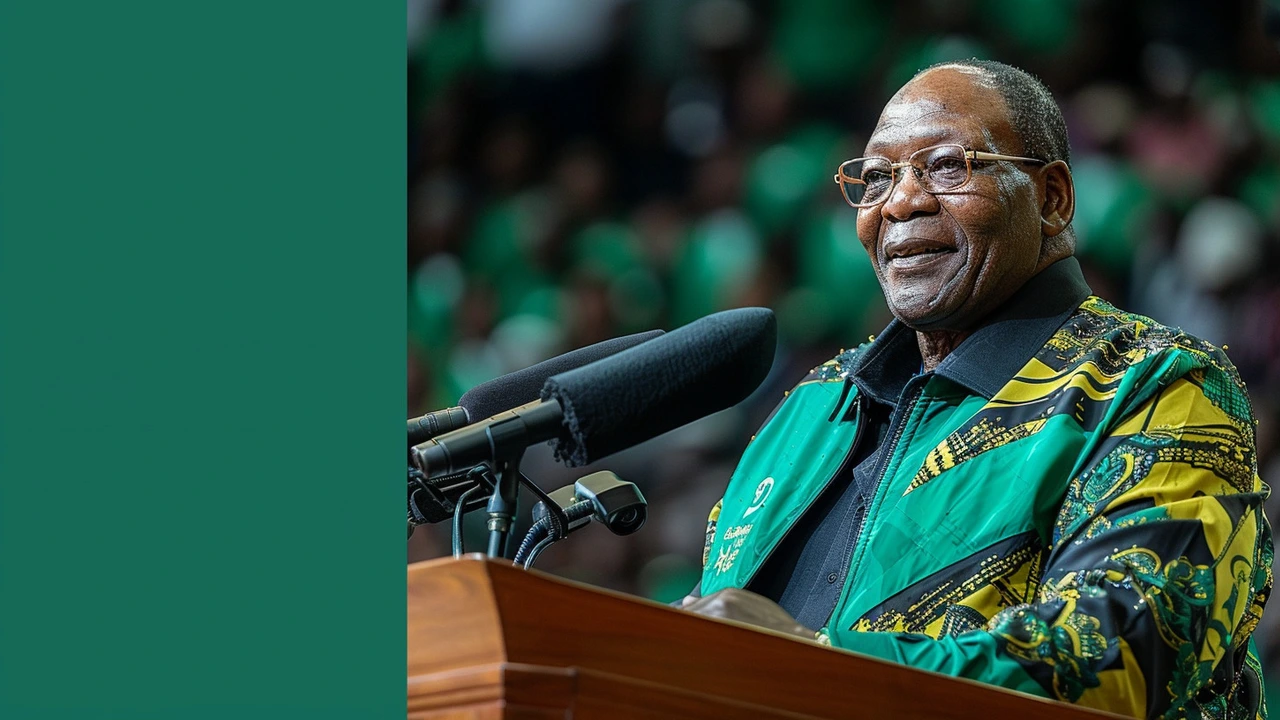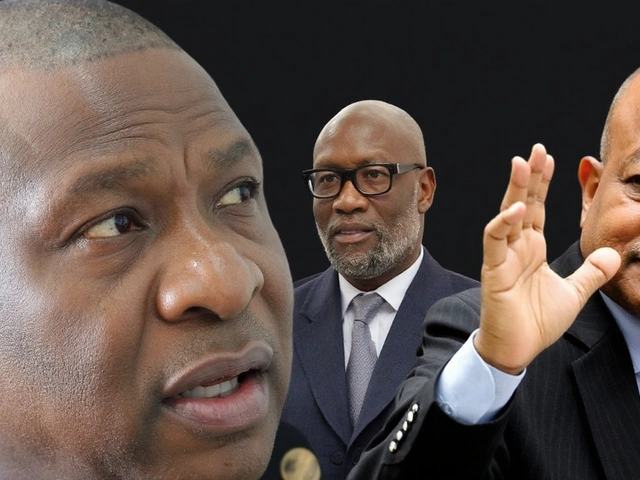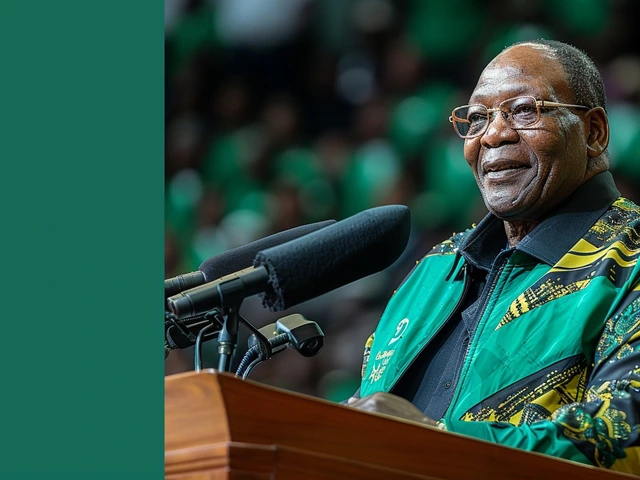Public Interest SA Criticizes Jacob Zuma Over Controversial Election Comments
Public Interest SA has come forward with strong words against the leader of the MK Party, Jacob Zuma, over his recent remarks regarding election results. Zuma claimed that the Independent Electoral Commission's (IEC) announcement of election results constituted a sort of provocation towards their party. His statements have incited a wave of criticism, particularly from those seeking transparency and accountability in the election process.
Interestingly, Zuma and his party, the MK Party, have voiced concerns about the legitimacy of the election outcomes. They've even gone as far as threatening legal actions to contest the results. However, the MK Party has notably failed to offer any concrete evidence to substantiate their claims, leaning instead on the legal argument of 'sub-judice'. This argument, it should be noted, is no longer applicable as a legal concept within the South African context, which has only added to the confusion and criticism surrounding their stance.
Zuma's Controversial Statements
Jacob Zuma's remarks have been met with disapproval from various quarters, not least Public Interest SA. By suggesting that the IEC's declaration of election results would serve as a provocation, Zuma appeared to imply that the electoral process was somehow biased or unfair, and that their party was being targeted specifically. These allegations have naturally sparked a considerable response, with critics arguing that such statements undermine the credibility of the electoral system and sow mistrust among the public.
Further adding to the controversy, Zuma’s assertion of potential legal actions without presenting tangible evidence only compounds the skepticism. In democratic processes, transparency is key, and the MK Party's inability or unwillingness to present solid proof of any misconduct has been perceived as a significant problem by Public Interest SA and other observers.
Public Interest SA's Stand
Public Interest SA, in their condemnation of Zuma’s remarks, has called for greater clarity from the MK Party. They criticize the party's reliance on outdated legal principles and their overall handling of the situation. The organization stresses the importance of evidence-based claims, especially in sensitive areas such as elections, where unfounded accusations can lead to unnecessary unrest and diminished public trust.
In a statement, a spokesperson from Public Interest SA said, “It is imperative for the MK Party to either substantiate their allegations with proof or concede that their claims are unsubstantiated. The integrity of our electoral process depends on the transparency and accountability of all participating parties.” This statement underscores the broader issue at hand: the need for all political entities to act responsibly and to foster trust in the democratic systems that govern them.
The Repercussions of Baseless Allegations
Baseless allegations in any electoral process have the potential to cause significant disruptions and unrest. When a political leader like Jacob Zuma makes statements questioning the validity of the election results without solid evidence, it casts a shadow over the entire election process. This can lead to a certain level of chaos, as supporters of the party may feel disenfranchised and mistrustful of the political system as a whole.
Moreover, such actions and statements can lead to legal battles that consume time and resources. Legal systems may become clogged with cases that lack substantive backing, just because a political entity feels aggrieved by the results. These tactics divert attention and resources from more pertinent issues that require immediate attention.
Calls for Legal and Electoral Reform
This incident has prompted many to call for legal and electoral reforms to ensure the robustness of the democratic process. Transparency and accountability mechanisms need to be strengthened to prevent such accusations from taking root without substantial proof. In this regard, electoral bodies like the IEC play a crucial role in maintaining the integrity of the election process.
One proposal discussed includes establishing more stringent guidelines for challenging election results. This would require any party contesting the outcome to present clear and convincing evidence before any legal proceedings can be initiated. This could serve as a deterrent against frivolous challenges designed to disrupt the democratic process.
Additionally, educational campaigns highlighting the importance of transparency and evidence in contesting election results could also help in minimizing such issues. These campaigns would aim to inform the general public about the electoral process and the importance of baseless allegations in jeopardizing democracy.
The Broader Impact on South African Politics
Jacob Zuma's statements are indicative of a broader trend in South African politics, where accusations without evidence are sometimes used as political tools. This case stresses the necessity for political parties to act responsibly and foster an environment of trust and transparency. The public's trust in the democratic process is paramount, and parties need to engage with the process constructively and honestly.
Further analysis by political experts suggests that incidents like these may have lasting impacts on voter behavior and engagement. Distrust in the electoral process can lead to decreased voter turnout, which, in turn, impacts the legitimacy of the elected officials and the political stability of the country.
As the nation moves forward, it is crucial for political entities and relevant organizations to work towards regaining and maintaining public trust. This can be achieved through concerted efforts to improve transparency, accountability, and the robustness of the electoral process.
In summation, the controversy surrounding Jacob Zuma's comments and the MK Party's stance serves as a reminder of the importance of integrity, evidence-based claims, and responsible political conduct. As South Africa navigates these challenges, the focus remains on upholding the principles of democracy and ensuring a fair and transparent electoral process for all. Public Interest SA's call for clarity and accountability should resonate across the political spectrum, emphasizing the need for responsible and transparent political engagement.







JAYESH DHUMAK
June 4, 2024 AT 20:05The recent statements by Jacob Zuma have reignited a longstanding debate concerning the integrity of electoral processes in South Africa.
By characterizing the Independent Electoral Commission's announcement as a provocation, Zuma implicitly questions the impartiality of an institution that is constitutionally mandated to safeguard democratic outcomes.
The rhetoric, when emanating from a former head of state, carries considerable weight and can potentially erode public confidence in the very mechanisms that underpin representative governance.
The legal doctrine of sub-judice, although historically significant, no longer functions as a shield for unfounded claims within the South African jurisprudential framework.
Consequently, any attempt by the MK Party to invoke this doctrine without substantive evidence may be perceived as a procedural maneuver rather than a legitimate grievance.
Academic literature on electoral legitimacy consistently emphasizes that the burden of proof lies with the challenger, not the custodians of the process.
In the absence of verifiable irregularities-such as ballot stuffing, tampering, or systematic disenfranchisement-public interest organizations like Public Interest SA are justified in demanding concrete documentation.
The failure to produce such documentation not only weakens the MK Party's legal standing but also fuels speculative narratives that can destabilize the post‑election environment.
Moreover, the specter of frivolous litigation threatens to divert scarce judicial resources away from pressing societal matters, thereby imposing indirect costs on the citizenry.
Historical precedents in other Commonwealth nations illustrate that unsubstantiated challenges tend to be dismissed swiftly, reinforcing the resilience of mature democratic institutions.
Nonetheless, the perception of procedural fairness remains a critical variable influencing voter turnout and civic engagement.
When political leaders publicly doubt the legitimacy of outcomes, even without evidentiary support, they may inadvertently depress participation in future elections.
To mitigate these adverse effects, electoral commissions worldwide have adopted stringent guidelines requiring challengers to disclose substantive evidence at early procedural stages.
South Africa could benefit from a similar regulatory refinement, thereby curbing the propagation of baseless allegations while preserving the right to legitimate contestation.
Educational campaigns aimed at demystifying the electoral tallying process can further inoculate the electorate against misinformation.
Ultimately, a balanced approach-combining rigorous legal standards with transparent public communication-will serve to reinforce confidence in South Africa's democratic architecture.
Santosh Sharma
June 5, 2024 AT 07:11Providing verifiable evidence is not merely a procedural formality; it is the cornerstone of any credible challenge.
When parties present documented irregularities, electoral commissions can assess allegations with the rigor they deserve.
Conversely, baseless claims serve only to distract from substantive policy debates.
Strengthening the evidentiary threshold would discourage opportunistic litigation.
Such reforms could preserve judicial resources and maintain public trust in the democratic process.
yatharth chandrakar
June 5, 2024 AT 16:55The MK Party's invocation of the now‑obsolete sub‑judice argument reflects a broader trend of legal posturing rather than factual scrutiny.
In comparative politics, we observe that parties often resort to legal rhetoric to galvanize their base when electoral outcomes are unfavorable.
However, without transparent data-such as polling station logs, voter‑list audits, or independent observation reports-the accusations remain speculative.
South Africa's electoral framework already incorporates multiple layers of oversight, including domestic observers and international monitors.
Any credible allegation should therefore be anchored in tangible discrepancies rather than abstract legalese.
Moving forward, a systematic approach that mandates the disclosure of specific irregularities before filing a case could enhance accountability.
Such a measure would also align with best practices observed in mature democracies, where courts act as arbiters only after substantial evidence is presented.
Ultimately, the health of the democratic process hinges on the willingness of political actors to engage in good‑faith dialogue supported by factual substantiation.
Vrushali Prabhu
June 6, 2024 AT 01:15wow this whole provocation drama is just plain bs.
parlan caem
June 6, 2024 AT 08:11Zuma’s spiel is a classic case of political theatrics designed to sow doubt.
Without any shred of proof, it’s nothing more than a desperate attempt to rally his loyalists.
Mayur Karanjkar
June 6, 2024 AT 13:45Empirical validation is the lingua franca of legitimate contestation; absent that, the claim collapses.
Sara Khan M
June 6, 2024 AT 18:45🙄 Another drama, another set of unsubstantiated claims. 📢
shubham ingale
June 6, 2024 AT 22:55Interesting take. It feels like we keep circling back to the same old story of saying it’s a provocation without any hard data 🙃
Ajay Ram
June 7, 2024 AT 02:15The pattern emerging here is illustrative of a deeper systemic issue where political narratives are leveraged to undermine institutional credibility.
When influential figures such as Zuma articulate doubts without offering empirical substantiation, it reverberates across the electorate, engendering skepticism.
This skepticism is not merely about the specific election but about the broader democratic contract that binds citizens to their governance structures.
Consequently, the role of civil society organizations, like Public Interest SA, becomes pivotal in re‑anchoring the discourse to factual foundations.
Their calls for transparency and evidence-based claims serve as a counterbalance to populist rhetoric that thrives on ambiguity.
Moreover, the legal community must reinforce procedural safeguards that demand disclosure of concrete proof before any legal challenge proceeds.
Such safeguards protect the judiciary from being clogged with frivolous litigation, preserving its capacity to address genuinely substantive grievances.
In parallel, electoral bodies could enhance public outreach by publishing detailed post‑election audit reports, thereby demystifying the tallying process.
These reports would empower voters with verifiable information, diminishing the potency of speculative allegations.
Educational initiatives, perhaps in collaboration with academic institutions, could further cultivate an informed electorate capable of critically assessing political claims.
Ultimately, a synergistic approach-combining legal rigor, institutional transparency, and citizen education-will fortify the democratic ecosystem against destabilizing narratives.
Dr Nimit Shah
June 7, 2024 AT 05:01Honestly, it’s tiring to watch the same old blame game play out without any solid evidence.
We need real data, not just political posturing.
Ketan Shah
June 7, 2024 AT 07:31Given the lack of concrete proof, the party’s claims appear more rhetorical than factual.
Aryan Pawar
June 7, 2024 AT 09:45Need real proof before we start doubting the whole system
Shritam Mohanty
June 7, 2024 AT 11:41What they don’t tell you is that there’s a whole shadow network pulling the strings behind the scenes.
Every time an “official” result comes out, there’s a hidden algorithm tweaking the numbers.
The IEC is just a front; the real power lies in undisclosed data farms that can rewrite outcomes in milliseconds.
If you look at the pattern of “unexplained” delays and sudden “technical glitches,” it’s clear there’s sabotage at play.
Don’t be fooled by the polished statements of NGOs; they’re paid to keep the narrative clean.
The truth is buried deep, and only a few insiders know how to access the real vote tallies.
Anuj Panchal
June 7, 2024 AT 13:21From a procedural standpoint, any challenge to election results should be accompanied by a detailed audit trail.
Without timestamps, ballot serial numbers, and chain‑of‑custody documentation, the claim lacks operational legitimacy.
Future reforms might include blockchain‑based logging to ensure immutable records.
Prakashchander Bhatt
June 7, 2024 AT 14:45It’s a reminder that evidence matters more than rhetoric.
Mala Strahle
June 7, 2024 AT 15:51While the passion behind the MK Party’s grievances is palpable, the absence of verifiable data undermines any constructive dialogue.
Political discourse thrives on substantiation; without it, accusations become merely noise that dilutes genuine concerns.
The public deserves clarity, and the electoral commission deserves respect for its mandate.
To restore confidence, parties must commit to evidence‑based claims and engage in transparent processes.
In this way, the democratic fabric can be strengthened rather than frayed by unfounded allegations.
shubham garg
June 7, 2024 AT 16:41Yo, let’s keep it real – no proof, no drama.
LEO MOTTA ESCRITOR
June 7, 2024 AT 17:15Stay positive, folks – evidence will sort things out!
Sonia Singh
June 7, 2024 AT 17:31Thanks for sharing, looking forward to more transparent discussions.